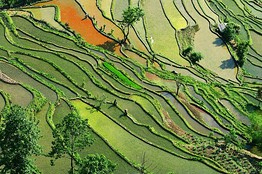 The British writer Bruce Chatwin, in his 1989 book “What Am I Doing Here,” ascribed the power of Chinese emperors to nothing more than the authority over agriculture.
The British writer Bruce Chatwin, in his 1989 book “What Am I Doing Here,” ascribed the power of Chinese emperors to nothing more than the authority over agriculture.
“Imperial decrees,” Chatwin wrote, “used to begin ‘The World is based on Agriculture.’”
It’s been more than 20 years since Chatwin wrote and a millennium since the era he evoked.
But in China, even the most massive changes in income levels can’t mask the same fault lines that pervade the task of governing this old, big country.
So even as China declares its seventh annual consecutive record harvest this month, the concern over national hunger — manifested as government efforts to defend 95% self-sufficiency in food — has not abated.
If anything, a top United Nations official says it’s only intensified.
Olivier De Schutter, the United Nations Special Rapporteur on the right to food, wrote in a six-page report published Thursday that since 1997, China has lost 8.2 million hectares of arable land because of urbanization, industrialization or natural disasters. That’s nearly a tenth of the amount of arable land used to produce five major grain and oilseed categories this year, by official estimates.
“China faces considerable ecological threats and challenges, with deep potential consequences for both food security at the national level and the realization of the right to food of vulnerable groups,” De Schutter pointed out.
Water scarcity is “a huge problem,” he said. The amount of water available to each person in China is less than one third the world average, he wrote.
More than a third of the country’s territory suffers from land degradation, he said.
“This shrinking of arable land represents a major threat to the ability of China to maintain its current self-sufficiency in grain, and it fuels competition over land and land evictions,” De Schutter noted.
Climate change could lop a further 5 to 10 percent off agricultural productivity by 2030.
The recommendations of the special rapporteur, an independent office reporting to the U.N. General Assembly, aren’t anything the government doesn’t already know or isn’t already working on.
Among others, De Schutter urged Beijing to quickly address income gaps, improve the rights of rural migrants, beef up security of land tenure and access to land, transit toward more sustainable agriculture, and address nutrition and food safety.
Food prices this year have risen sharply, bringing inflation to a 28-month high, to a point where eggs and milk in the city of Hangzhou, near Shanghai, may have risen beyond comparable tags in Boston. It’s certainly prompted a policy rethink at the highest levels of government.
Officially, the government still mostly blames bad weather and speculators.
But there are deeper systemic worries.
If they aren’t addressed, as De Schutter warned, the relentless upward pressure on food prices is just “a harbinger of what may be lying ahead.”
Source: WallStreetJournal.com– Chuin-Wei Yap